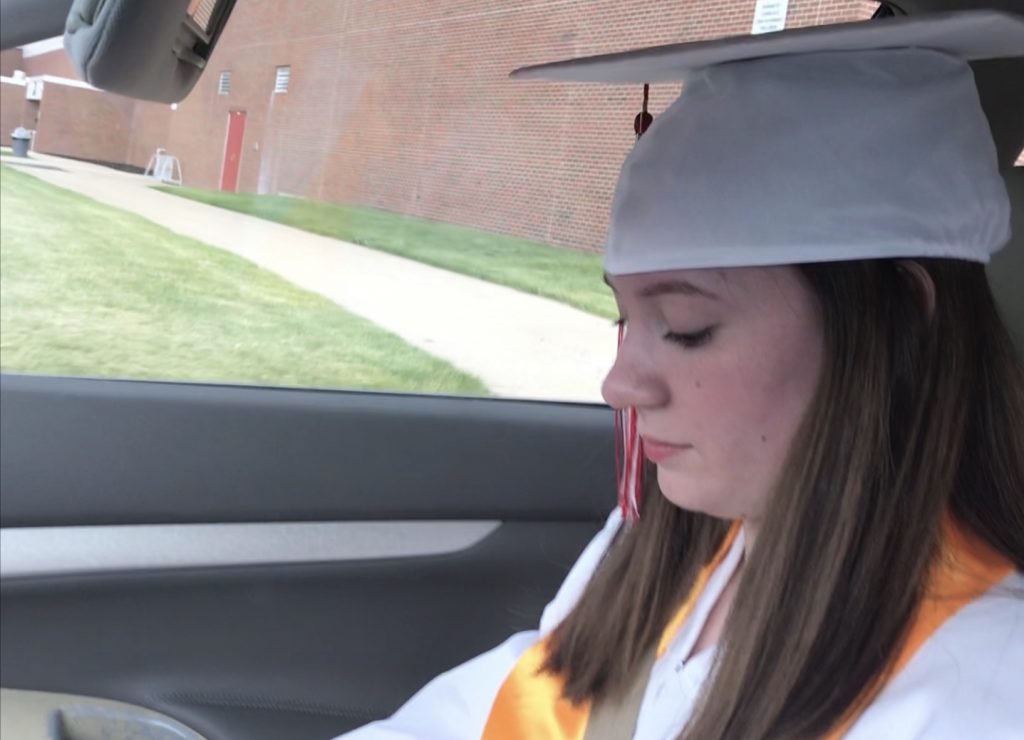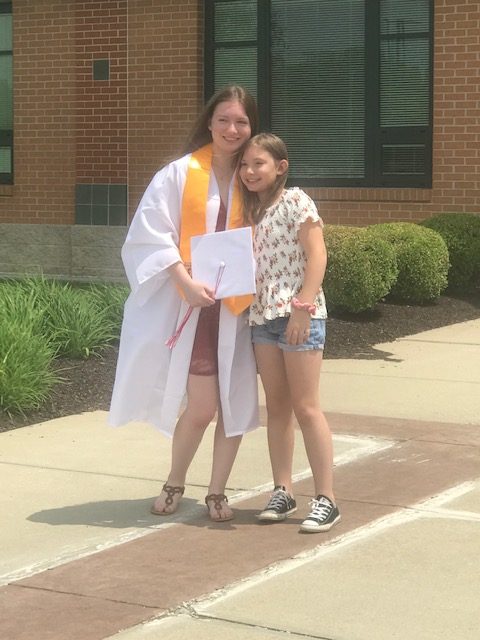
My Saturday last is a lesson for all of us. The small moments of May 23rd have a larger meaning in the midst of Covid-19. I’ve got a feeling about the truth of this. I invite you to stay with me for a few minutes.
I began the day with some dread, to be honest. High school graduation. My fear was that the Covid-revised ceremony would encapsulate our overall feeling of a sad end to our oldest daughter’s senior year. The revised plan was for a family, including the graduating student, to ride in their vehicle from one station to the next, culminating in a quick stop at a makeshift stage. A handshake, a diploma, a photo and then, whoosh, off we’d go. The whole thing seemed ripe for disappointment, regret, and a forlorn feeling. It was too late for me to do anything about it. I felt awful as the clock ticked toward our 12:30pm departure.
Point #1—Once there, in our car, driving from station to station, there was a vastly stronger personal and family connection to this moment than I’ve ever seen occur in a blazing-hot gymnasium with sweating adults, fussy toddlers, and bored teenagers dressed in gowns. Instead, in the split-second, we told her and she told us of mutual love, mutual pride, mutual gratitude for everything she had done and accomplished. Our daughter thoroughly enjoyed the moments. We weren’t sitting fifty rows away. We could see and feel the entire thing. She wasn’t pretending. We could tell she was genuinely happy. I’ll never forget it.
Takeaway: don’t think your expectations of the future ahead are always the reality of the present as it’s lived. You can plan and have an opinion of a plan. The truth is, though, that you still have to experience the present as it unfolds. The experience can prove starkly different than everything you’ve assumed. It’s drilled into us that reality’s collision with planning results in unappealing scenarios and lesser-evil tradeoffs. But I have to say—sometimes we’re so focused on being ready to deal with setbacks and misfires that we overlook new opportunities that pop and flash when things actually go better than assumed. Hope is a spirit of potential and awareness.
Point #2—At each station where we stopped our car (to return a school laptop, to pick up a packet of awards, and so on), a small group of staff was waiting. Seeing the car and our daughter seated with cap and gown on, they began cheering and encouraging and celebrating: “Yay, great job!” “Awesome!” “Good for you!” They’re clapping and yelling as I slowly drive our car to a stop and our daughter lowers her window next to the tables. Then, a staff member—very sincere and well-meaning, no doubt about it—looks at our daughter and says, “What’s your name?” She says her name. Checked off the list. Waved through to drive on. Same scene repeats at the next stop and station. Awesome!; what’s your name?; check-box; wave-and-drive-on. I do think the high school principal who handed out the diploma did know our daughters’s name because of her academic awards. Now don’t get me wrong. I’m not criticizing. It’s a big graduating class. Lots of stress lately. God bless ’em for everything they did. It’s just that the two things—the clapping hands and cheering voices on one hand, the not-knowing the name of the person being cheered and clapped for on the other—well, it just seemed rather mismatched. We didn’t dwell on it, but in a different circumstance the feeling would have lingered and maybe worsened.
Takeaway: our culture has a long way to go to build meaningful relationships in neighborhoods, schools, businesses, churches, (families, too) and everywhere else people gather or come together for whatever reason. They do exist, I know. The problem is that genuine relationships are exceptions, not the rule. The surface banalities and the substance realities are usually miles apart. If we’ve seen anything in covid-19 it’s that relationships need (and take) time, effort, energy. For me, and maybe it’s only me, I find myself far less interested and less patient these days in accepting a surface approach and mentality as OK and that other people (customers, clients, audiences, readers, and a hundred other personal settings) are OK with it. It’s not, they’re not. And go a step further—they shouldn’t be.
Point #3—As I mentioned, at a couple of stations our daughter received folders and packets. Inside were various awards and certificates. She told us these would have been given out at banquets and ceremonies across a normal final month of school. We would have gone to such events as a family (though our youngest, a 5th-grader, would have been grumpy about it!). The events would have been scheduled, held, and marked-off as they happened. One by one by one.
Takeaway: well, frankly, I’m not entirely sure. Need to think more about it. Still, I believe there is something here to consider. Let’s start with our daughter’s record of work over a few years which was, in normal circumstances, condensed into recognition on paper and in events over a few weeks. Then, with Covid-19, even the condensation is condensed—down to folders and envelopes stuffed with papers and handed into our car. A few weeks become a few seconds. We’ve all seen time change during stay-at-home and work-at-home (for those who can) since March 2020. Zoom meetings, constant meetings, fill-in-the-blank meetings, they’ve both compressed work and expanded work simultaneously. Time is far more flexible and pliant than we think it is. We forget this realization with all the fixed numbers on time-pieces, be they clocks, watches, phones, computer screens, even calendars. The numbers are the numbers and we easily slip into a mode of time-is-unchangeable. We ought to consider that perhaps a benefit of Covid-19 (tiny, of course, in contrast to sickness and death) is its disruption of time in our minds. Time jars loose, revealing gaps, holes, and empty spaces where we can do more than we expect and where time experienced changes.
Point #4—A thunder storm swept through the graduation event probably three or four cars after ours. Our daughter found out later that the storm caused an hour delay. They did finish. That’s good. I spent our drive and the rest of the day reflecting on all that had happened. I realized that one of the overarching facts of the day was that the large had become the small. An event that would have spanned parking lots, a school’s hallways and gymnasium, and multiple open-houses and parties was no longer any of that. It was our car and our house. Actually, there was one other place we went on our way to the graduation—our graduating daughter met two of her graduating friends at the elementary K-5th grade school which they had attended together. As it happens, our 5th grader went to the same school and was, in fact, a “graduate” of it now as well. She had been denied her version of graduation, too. So, with our 5th grader, our 12th grader and her two friends, we were able to take several truly special photos in the front of the K-5 school. Fun, personal, meaningful, memorable. All of these things and inexpressibly more.
Takeaway #4: it feels like the compression takeaway above, don’t you think? The difference is that the thing being compressed here isn’t time. It’s scale, or the space of scale. Without us, the large was now smaller. School officials altered the broad mass event into a rolling group event. We didn’t have options or input and that was fine, completely understandable. But with us—with our changes and adjustments, our “touches”, if you will—we were able to take the smaller, the rolling group event, and make it into something not only smaller but also individual as well as personal, lasting, and eternal. To me, it feels like the difference between the waters of a fountain and the waters of a spring.
We will go back there to be cooled and refreshed, again and again, as the years flow and roll by.
I hope you enjoyed my Memorial’s Saturday. You and I may wish to recall it as the rest of 2020 appears.








